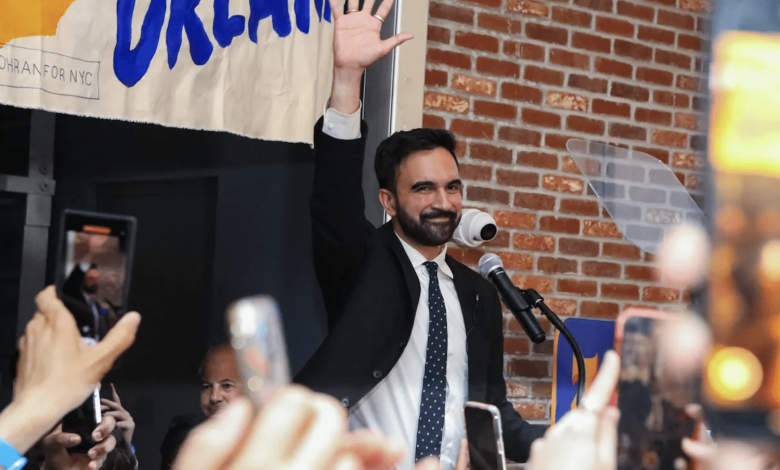
“Time for Change”: Mamdani’s NYC Victory Reshapes Democratic Politics
Zohran Mamdani, a democratic socialist, has won NYC’s primary election by promising radical economic changes for city residents. His victory marks a remarkable political upset. Mamdani edged past his opponent after polling at just 1% support five months ago. His popularity soared as support jumped from 22% to 32% in a single month, with voters under 50 backing him by a 2:1 margin.
Mamdani’s bold economic policies struck a chord with workers, young people, and middle-class voters in one of the world’s costliest cities. His platform’s centerpiece is a rent freeze plan that would help over 2 million tenants in rent-stabilized apartments who face rising costs and displacement. He supports a new minimum wage law to boost NYC’s wage floor to $30 an hour by 2030. The candidate’s transportation strategy builds on fare-free bus programs that boosted ridership by more than 30%.
His economic agenda calls for higher taxes on corporations and wealthy residents. The plan includes a 2% flat tax on New York’s households earning more than $1 million yearly. Critics have challenged these proposals, but Mamdani’s platform has united a broad coalition of voters, including thousands from New York’s 1.2 million Jewish residents. His win has altered the map of NYC’s political scene, as economists and voters analyze what his economic reforms could mean for the city’s future.
Mamdani Wins NYC Primary in Historic Upset

Image Source: Left Voice
Zohran Mamdani took a decisive lead in New York City’s Democratic mayoral primary. He secured 43.5% of first-choice votes while former Governor Andrew Cuomo trailed at 36.4%. This upset ranks among the biggest political surprises in NYC’s modern history.
How Mamdani defeated Cuomo in a high-stakes race
Nobody knew much about this 33-year-old state assemblyman when the race started. Yet he built a powerful grassroots campaign that beat Cuomo’s well-oiled political machine. His team of 50,000 volunteers hit the streets hard and knocked on about a million doors citywide. This energetic ground game made all the difference. His message strongly connected with:
- Young voters who loved his social-first strategy and promises about affordable living
- People living in up-and-coming areas like Ridgewood and Greenpoint
- Asian and Hispanic voters, especially in Queens’ South Asian neighborhoods
Cuomo chose a different path. He stuck to a safe “rose-garden campaign” and mostly showed up at churches, synagogues, and friendly union halls. He spent $20 million on ads – more than every other candidate put together. Still, he couldn’t stop Mamdani’s momentum.
What this means for the Democratic Socialists of America
This win marks a huge moment for the Democratic Socialists of America. After Alexandria Ocasio-Cortez’s stunning 2018 congressional victory, this success proves DSA can win big races in America’s largest city. Senator Bernie Sanders and Representative Ocasio-Cortez backed Mamdani. Sanders called it a “brilliant campaign”.
Reactions from political leaders and the public
The results sparked intense debate. President Donald Trump labeled Mamdani “a 100% Communist Lunatic”. Republican Vice President JD Vance threw shade by congratulating the “new leader of the Democratic Party”.
Democratic leaders played it safe. Senate Majority Leader Chuck Schumer and House Minority Leader Hakeem Jeffries praised Mamdani’s campaign without fully endorsing him. Some moderates pushed back – Representative Laura Gillen said Mamdani was “too extreme to lead”.
Voter turnout hit remarkable levels. About 1.1 million people voted – more than a third of NYC’s registered Democrats.
Mamdani Proposes Sweeping Economic Reforms
Mamdani’s campaign focuses on a complete economic agenda that tackles New York’s affordability challenges. His platform presents major policy initiatives to address housing costs, childcare access, food inflation, and transportation.
Rent freeze and 200,000 new affordable homes
The heart of Mamdani’s housing plan calls for an immediate rent freeze that would help over 2 million residents in rent-stabilized apartments. This freeze would provide urgent relief to tenants who face inflationary pressures and risk of displacement. His long-term vision includes building 200,000 additional rent-stabilized and public housing units in the next decade. The plan would need USD 70 billion in borrowing over ten years, which is by a lot more than the city’s current USD 25 billion allocation for affordable housing.
Free childcare and baby baskets for all families
Free childcare stands as the life-blood of Mamdani’s platform for children between six weeks and five years old. Economists backing his plan point out that today’s expensive childcare costs force parents, especially women, to leave their jobs. This policy would create quality jobs in the care economy and generate economic benefits throughout the city. The plan also promises “baby baskets” filled with educational resources and basics like diapers, baby wipes, and swaddles for new parents.
City-owned grocery stores to fight food inflation
Mamdani’s solution to curb rising food prices involves opening city-owned grocery stores in each borough. These municipal markets would run on city-owned land without rent and property taxes. The stores would buy at wholesale prices and use centralized warehousing to keep costs down. Cities like St. Paul and Atlanta already have government-supported grocery stores that work well.
Fare-free busses and expanded public transit access
The campaign promotes free city busses, building on a successful pilot program that boosted ridership by more than 30% on weekdays and 38% on weekends. This initiative would cost between USD 652-778 million each year. The pilot program led to almost 40% fewer attacks on bus operators. Mamdani wants to add over 30 miles of new bus lanes yearly and expand transit signal priority technology to optimize service.
Economists Endorse Mamdani’s Agenda as Sound Policy
Image Source: ABC News – The Walt Disney Company
Leading economists have backed Zohran Mamdani’s economic agenda against critics who doubt whether it makes financial sense. These experts highlight how his policies fix market problems in housing, transportation, and basic services.
Why leading US economists support his rent and transit plans
Nobel laureate economist Joseph Stiglitz sees Mamdani’s rent stabilization proposals as “necessary interventions in a demonstrably broken housing market.” Economists from Columbia University and CUNY have published studies that show well-implemented rent controls can prevent displacement without hurting housing supply too much.
The free bus service plan has got support from transportation experts who point out a simple fact – collecting fares costs about 15-20% of what they bring in. Making busses free creates better efficiency and gets more riders while cutting down traffic jams.
Economic rationale behind public grocery stores
Urban economy experts view public grocery stores as what they call a “merit good.” These stores help neighborhoods that don’t have good food options because private companies haven’t invested there. MIT economists have shown that city-owned markets create competition that brings down prices even in private stores nearby.
Studies suggest city-owned grocery stores could cut food costs by 15-25% for families with lower incomes. This saves them money they can spend on other things that help local businesses grow.
How universal childcare boosts workforce participation
The numbers make a strong case for Mamdani’s universal childcare program. Research from the Federal Reserve Bank of New York shows every dollar put into quality childcare brings back $7 in long-term economic benefits through:
- More mothers joining the workforce (about 10-15% more)
- Parents earning more over their careers by staying employed
- Better education results for kids who get quality early care
- Less public money spent on extra education and social services
Economists say Mamdani’s childcare policy hits what they call a “triple dividend” – it helps child development, supports parents’ careers, and boosts the economy all at once.
Business Leaders and Critics Warn of Economic Risks
Image Source: Reddit
Business leaders and politicians warn about what it all means for New York City’s economy if Mamdani’s economic proposals become reality. The city’s economic map could face dramatic changes according to industry representatives, business owners, and political opponents.
Concerns over $30 minimum wage in NYC
Business organizations strongly oppose Mamdani’s plan to raise the city’s minimum wage to $30 per hour by 2030. Queens Chamber of Commerce president Tom Grech called the proposal “unsustainable.” He emphasized that small merchants “can’t afford a minimum wage increase now. That would kill the bottom line. They’d have to cut employees”. Critics believe this could lead to fewer jobs, higher prices, and businesses shutting down. In spite of that, some cities are already moving in this direction. Los Angeles passed a law to raise tourism workers’ minimum wage to $30 per hour by 2028.
Corporate tax hikes and fears of business flight
New York’s business community is nervous about the proposed corporate tax rate increase to 11.5%, matching New Jersey’s rate. While Mamdani projects $5 billion in revenue, business leaders worry companies will leave. Gristedes grocery chain owner and billionaire John Catsimatidis didn’t mince words, threatening to move his companies’ headquarters to New Jersey if Mamdani wins. “We don’t want to do business with socialists,” he stated. On top of that, hedge fund managers Bill Ackman and Daniel Loeb took to social media to express their concerns, with Loeb sharing memes about Florida real estate agents celebrating.
Delivery app regulation and gig economy backlash
Delivery app companies fight back against Mamdani’s proposed regulations. They worry about higher prices, job losses, lower tips, less flexible shifts, and “multi-apping”. A company representative hinted at legal action to keep current systems in place. City Comptroller Brad Lander sees it differently, arguing the current system “pads corporate profits off the backs of some of the hardest workers in our city”.
Cuomo and Adams label Mamdani a ‘snake oil salesman’
Mayor Eric Adams leads the charge against Mamdani, calling him a “snake-oil salesman”. Adams challenges Mamdani’s financial plans, asking “where are you going to get the money from?” He believes tax hikes will drive wealthy residents out of the city. Former Treasury Secretary Larry Summers shares these concerns, saying he feels “profoundly alarmed” by what he dubbed Mamdani’s “Trotskyite economic policies”.
What Mamdani’s Victory Means for NYC’s Economic Future
Zohran Mamdani’s unexpected primary victory marks a turning point in New York City politics. His journey from unknown candidate to Democratic nominee, despite strong opposition, shows how voter priorities have changed. His platform calling for economic transformation struck a chord with voters who are fed up with high costs and widening inequality.
Two competing economic visions for America’s largest city now face off. Mamdani’s bold agenda includes rent freezes, $30 minimum wage, universal childcare, municipal grocery stores, and fare-free transit. Business leaders claim these policies might drive away capital, force businesses to close, and reduce jobs.
Expert economists don’t agree either. Joseph Stiglitz supports stepping in to fix “demonstrably broken” markets. Former Treasury Secretary Larry Summers takes the opposite view, worried about what he calls “Trotskyite economic policies.” This split reflects the bigger national debate about how much government should be involved in the economy.
Mamdani’s primary win is a big deal, but the general election will show if New Yorkers want his democratic socialist approach. We have a long way to go, but we can build on this progress. His campaign has already changed how we talk about economic inequality. New York City now tests progressive economic policies that might spread across the country.
Success or failure, Mamdani’s campaign makes Americans think about what matters more: affordability or growth, regulation or free markets, public or private solutions. New York City voters’ choice will shape their city’s economy for years ahead.






